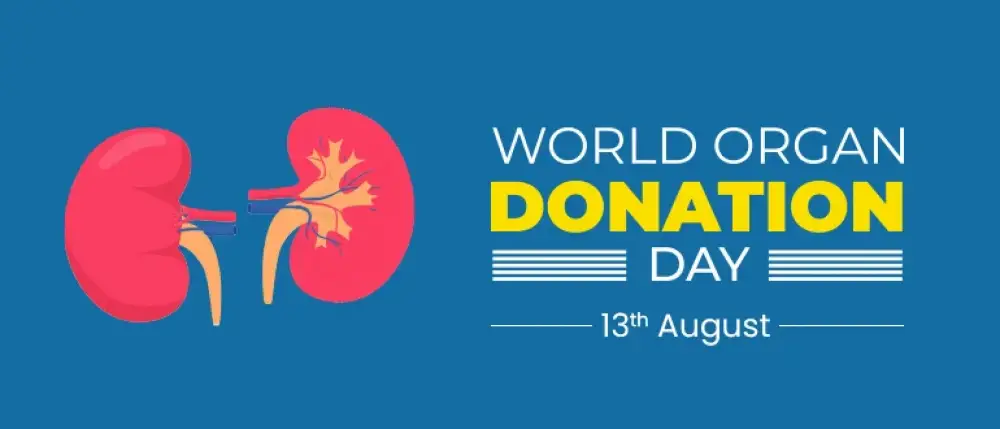Subscribe to get weekly insights
Always stay up to date with our newest articles sent direct to your inbox
Published on 5 Aug, 2024
Updated on 13 Feb, 2025
3262 Views
3 min Read

Written by Mudit Handa
1Like
Every 10 minutes, one person is added to the organ transplant waitlist, and 20 people die every day waiting for an organ in India. There is a significant gap between the demand and the supply. More than 3 lakh patients are waiting for organ donations, while the number of donors is only a few thousand. Only 10% of the patients waiting for an organ get it on time. According to the data, there is only one donor available per million population. Hence, to raise awareness about the significance of organ donation, World Organ Donation Day is observed globally on 13th August.
In this blog, we will explore the significance of World Organ Donation Day and the topic of organ donation.
World Organ Donation Day is an important global event that commemorates the first-ever living donor organ transplant done in 1954 in the USA. This day is celebrated every year to raise organ donation awareness and encourage more people to donate. However, many countries observe this day according to their history of organ donation.
In India, the first successful deceased organ donation occurred on 3rd August 1994. Hence, Organ Donation Day in India has been observed on 3rd August starting from 2023. Before 2023, National Organ Donation Day was celebrated on 27th November, starting in 2010.
The National Organ and Tissue Transplant Organisation (NOTTO) designated July as Organ Donation Month to commemorate the implementation of the Transplantation of Human Organ Act on 8th July 1994.
The main purpose behind celebrating this day is to make people pledge to donate organs after death. One deceased donor can save 8 lives and improve the lives of 75 people. World Organ Donation Day theme mainly focuses on,
This day is mainly celebrated to make people aware of the need for organ donation and the impact it can have on an organ recipient’s life.
This day aims to make more and more people pledge to donate organs to lower the gap between the supply and demand of organs.
The day also honours the contribution of the donors and their families in saving the life of the recipient. By recognising a donor’s selfless act, many people can be encouraged to do so.
The day also urges people to register as organ donors to make a difference in somebody’s life. The day aims to convert awareness into donation.
This day is celebrated by organising many events and organ donation seminars to share the stories of organ recipients to let people know about the positive impact of organ donation.
Organ donation can be done in two ways.
When a living person donates an organ or a part of the organ, it is called a living donation. The most common examples of living donations are kidney donation, liver donation, blood donation, etc. A person can donate an organ only if he is medically fit, and his blood group and the tissue match with the person who needs a transplant.
When a person’s organs are donated after his death, it is called cadaver or diseased donation. In such cases, the organs should be removed as soon as possible. A person who is willing to donate organs after his death needs to register for organ donation. How a donor dies is also an important factor in deciding which organs can be donated.
Any healthy individual irrespective of age, gender and religion can become an organ donor. It is a noble act and everyone should pledge their organs. You can fill out an online pledge form by Organ India to register as a donor. After the registration, a donor card with a unique registration number is issued by NOTTO. Remember in India, family consent is also important for organ donation.
World Organ Donation Day is a special day dedicated to honour the organ donors whose selfless acts have saved many lives. Moreover, individuals in need of an organ transplant should be aware that donor expenses are covered under health insurance coverage. Care Health Insurance offers coverage for organ donors, subject to specific terms and conditions. If you want to know more about the various insurance plans that cover organ donor expenses, reach out to our team for further information.
Disclaimers: The above information is for reference purposes only. Kindly consult your general physician for verified medical advice. The health insurance benefits are subject to policy terms and conditions. Refer to your policy documents for more information.
शुगर कंट्रोल कैसे करे? जानें, डायबिटीज में क्या खाना चाहिए Care Health Insurance in Health & Wellness
Thyroid : मामूली नहीं हैं महिलाओं में थायराइड होना, जानें इसके लक्षण और घरेलू उपचार Care Health Insurance in Diseases
हाई ब्लड प्रेशर को तुरंत कंट्रोल कैसे करें? देखें इसके उपाय Care Health Insurance in Diseases
प्लेटलेट्स की कमी के लक्षण, कारण और इलाज क्या है Care Health Insurance in Diseases
World Bipolar Day 2025: Understanding Bipolar Disorder and Breaking Stigma Care Health Insurance in Health Insurance Articles
ट्यूबरक्लोसिस (टीबी) के लक्षण, कारण और इलाज Care Health Insurance in Awareness Days
World Water Day 2025: Raising Awareness About the Global Water Crisis Care Health Insurance in Awareness Days
World Down Syndrome Day 2025: Let’s Improve Our Support Systems Care Health Insurance in Awareness Days